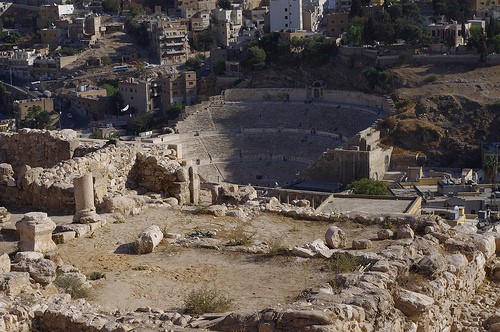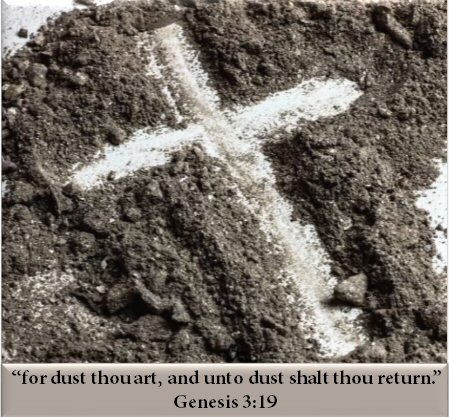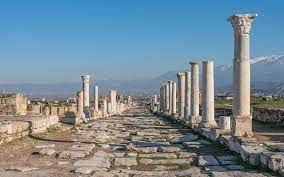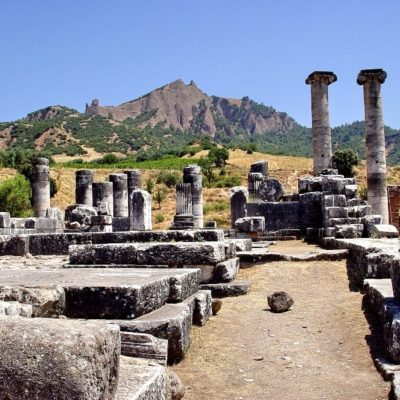The church in Philadelphia

Reveals who Jesus is:
“And to the angel of the church in Philadelphia write; These things saith he that is holy, he that is true, he that hath the key of David, he that openeth, and no man shutteth; and shutteth, and no man openeth;” (Revelation 3: 7).
The church in Philadelphia is a city of Lydia in Asia Minor, situated near the eastern base of Mount Tmolus, founded and named by the Pergamene king, Attalus II Philadelphus. After the death of Attalus III Philometor, 133 BC, it together with his entire kingdom came by his will under the jurisdiction of the Romans. (Strong. 2001. # 5359). Located nearly thirty miles to the southeast of Sardis and about sixty miles east of Smyrna, Philadelphia which is in modern Ala̧ehir. It was founded in 140 B.C. by Attalus the Second. His surname was Philadelphus, and out of love for his brother Eumenes he called the city Philadelphia, city of brotherly love.
The area around Philadelphia was volcanic and known as “the burnt land.” Volcanic ash fell on it and made the soil extremely fertile. Vineyards spread through the landscape and thus Philadelphia became known for wine and beverages. Because of volcanic activity in the area earthquakes often struck the city. A severe quake devastated the city in A.D. 17. Emperor Tiberius exempted Philadelphia from paying taxes. He donated a sum of money to be used to rebuild the city. Its inhabitants out of fear of the repeated tremors preferred to live outside the city walls in the countryside. (Kistemaker. 2001. Pg. 146).
Jesus is called holy and true. This self-description of Jesus gives an appropriate introduction of the letter to the Philadelphians, because Jesus counted on them to cherish both the attributes of holiness and truth. Holy refers in the moral sense of sharing God’s purity: (Strong. 2001. # 40). He that is true refers to that which has not only the name and resemblance, but the real nature corresponding to the name, in every respect corresponding to the idea signified by the name, real, true genuine. (Strong. 2001. # 228).
Jesus holds the key of David, which is a reference to his messianic lineage. “And the key of the house of David will I lay upon his shoulder; so he shall open, and none shall shut; and he shall shut, and none shall open.” (Isaiah 22:22). Matthew 16:19 we find Jesus promises to give Peter the keys of the kingdom of heaven, “And I will give unto thee the keys of the kingdom of heaven: and whatsoever thou shalt bind on earth shall be bound in heaven: and whatsoever thou shalt loose on earth shall be loosed in heaven.” The Lord Jesus Christ sets before the church in Philadelphia an open door to continual faithfulness. Jesus has the rule over all people. “But Christ as a son over his own house; whose house are we, if we hold fast the confidence and the rejoicing of the hope firm unto the end.” Hebrews 3:6).
Jesus is the one and only who holds absolute authority with that royal key of David. “I Jesus have sent mine angel to testify unto you these things in the churches. I am the root and the offspring of David, and the bright and morning star.” (Revelation 22:16). He is the absolute ruler in heaven and on earth “And Jesus came and spake unto them, saying, All power is given unto me in heaven and in earth.” (Matthew 28:18), for what Jesus opens no one can shut and what he shuts no one can open. His word and deed are final.
Jesus acknowledges their works:
“I know thy works: behold, I have set [to give or commit to someone something to be religiously observed (Strong. 2001. # 1325)] before thee an open door, and no man can shut it: for thou hast a little strength, and hast kept my word, and hast not denied my name.” (Revelation 3: 8).
An “an open door” is used of the opportunity of doing something; the door of the kingdom of heaven (likened to a palace) denotes the conditions which must be complied with in order to be received into the kingdom of God. (Strong. 2001. # 2374). And no man can shut it [metaph. to cause the heavens to withhold rain; to shut up compassion so that it is like a thing inaccessible to one, to be devoid of pity towards one; to obstruct the entrance into the kingdom of heaven] (Strong. 2001. # 2808). The little group of faithful Christians in Philadelphia were assured of a blessing because Jesus had opened the door to Gentile converts. The LORD God is sovereign in the work of salvation, for he either closes or shuts the doors of service.
The congregation of the church in Philadelphia has little a little strength, and has kept the Word of God and has not denied the name of Jesus. The church in Philadelphians were actively teaching and preaching Christ’s gospel. They had kept the word of Jesus, and they had not denied his name. The faithful saints in the church in Philadelphia had to endure hostility and opposition from Jews and Gentiles. Their enemies disagreed with the name and message of Jesus and rejected his followers because of their lifestyle. Yet the saints of the church in Philadelphian remained true to their Lord and, therefore, received his praise and blessings. (Revelation 3: 8).
Jesus Rebuke and admonished the church of Philadelphia
“Behold, I will make them of the synagogue of Satan, which say they are Jews, and are not, but do lie; behold, I will make them to come and worship before thy feet, and to know that I have loved thee.” (Revelation 3: 9).
Jesus will make those of the synagogue of satan, which say they are Jews and are not. Qualifying what the synagogue of satan is. A synagogue is described as an assembly of Jews formally gathered together to offer prayers and listen to the reading and expositions of the scriptures; assemblies of that sort were held every Sabbath and feast day, afterwards also on the second and fifth days of every week; name transferred to an assembly of Christians formally gathered together for religious purposes; the buildings where those solemn Jewish assemblies are held. Synagogues seem to date their origin from the Babylonian exile. In the times of Jesus and the apostles every town, not only in Palestine, but also among the Gentiles if it contained a considerable number of Jewish inhabitants, had at least one synagogue, the larger towns several or even many. These were also used for trials and inflicting punishment. (Strong. 2001. # 4864).
Satan is defined as an adversary (one who opposes another in purpose or act), the name given to the prince of evil spirits, the inveterate adversary of God and Christ. He incites apostasy from God and to sin; circumventing men by his wiles; the worshippers of idols are said to be under his control; by his demons he is able to take possession of men and inflict them with diseases. By God’s assistance he is overcome on Christ’s return from heaven he will be bound with chains for a thousand years, but when the thousand years are finished he will walk the earth in yet greater power, but shortly after will be given over to eternal punishment. (Strong. 2001. # 4567).
The two church of Smyrna and Philadelphia are the only two of the seven churches that make specific reference to the Jewish people, their synagogue, and their master Satan. Jews denounced both Jewish and Gentile Christians during the worship services in the local synagogues. mJewish people who converted to Christianity were no longer accepted nor tolerated in the synagogues after the destruction of the temple and city of Jerusalem in A.D. 70. Two decades later Jewish leaders met in Jamnia to acknowledge the canon of the Scriptures and to formulate the so-called Eighteen Benedictions. The twelfth petition in this prayer pronounces a curse on the apostates: (Instone. 2003).
For apostates let there be no hope, and the kingdom of insolence mayest thou uproot speedily in our days; and let Christians (noṣerim) and the heretics (minim) perish in a moment, let them be blotted out of the book of life and let them not be written with the righteous. Blessed art thou, O Lord, who humblest the insolent. (Sailer. 2012).
The message to the church in Philadelphia again speaks of a synagogue of Satan who claim to be Jews but are not, whose members will in the end bow down before John’s listeners. The second part of the message given to the church in Philadelphia is they will be made to know that Jesus has loved them. Jesus proves his love to the Philadelphians by saying that even the opposing Jews will confess that Jesus loves them.
“Because thou hast kept the word of my patience, I also will keep thee from the hour of temptation, which shall come upon all the world, to try them that dwell upon the earth.” (Revelation 3: 10).
Because the church in Philadelphia kept the “word of my patience” means steadfastness, constancy, endurance; in the New Testament the characteristic of a man who is not swerved from his deliberate purpose and his loyalty to faith and piety by even the greatest trials and sufferings. (Strong. 2001. # 5281). Because the church in Philadelphia has kept Jesus word of patience He will also keep them from the hour of temptation to sin and the trial that is about to come upon the whole world to try those who dwell upon the earth. John 17:15 is a great reminder that Jesus asks not that God take believers out of this world but that he protect them from the onslaughts of the evil one. Jesus sends his people into the world with the assurance that he will preserve them.
The term “to try” means to attempt, endeavor; to try, make trial of, test: for the purpose of ascertaining his quality, or what he thinks, or how he will behave himself. (Strong. 2001. # 3985). The LORD God is testing them and permits Satan to tempt them. This means for the Christians that in times of temptation they overcome through God’s power and are strengthened in their faith. It is important to remember that times of testing come to any church and to all believers in every age. The church in Philadelphia experienced its hour of trial. Jesus promises the believers in the church in Philadelphia to protect them from spiritual death. This trying is not just for the church in Philadelphia alone it is for all the world and those that dwell upon the earth. This would be referenced to the return of Jesus since it is referring to the entire church at one time. The phrase “those who dwell upon the earth” applies to unbelievers as well as the believers.
“Behold, I come quickly: hold that fast which thou hast, that no man take thy crown.” (Revelation 3: 11).
Jesus is warning the congregation in the church in Philadelphia that he was coming speedily; they were to hold fast which means to keep carefully and faithfully; to continue to hold, to retain (Strong. 2001. # 2902) what you already have to no one can take your crown [metaph. the eternal blessedness which will be given as a prize to the genuine servants of God and Christ: the crown (wreath) which is the reward of the righteousness. (Strong. 2001. # 4735)].
The Scripture also tells us; everyman that strives for the mastery which is metaph. to contend, struggle, with difficulties and dangers; to endeavor with strenuous zeal, strive: to obtain something (Strong. 2001. # 75) is temperate. Which is to be self-controlled, continent (Strong. 2001. # 1467) in all things. Now they do it to obtain a corruptible crown; but we do it for an incorruptible crown. (1 Corinthians 9:25). The apostle Paul wrote; “Therefore, my brethren dearly beloved and longed for, my joy and crown, so stand fast in the Lord, my dearly beloved.” (Philippians 4:1). Then again 2 Timothy 4:8 tells us; “Henceforth there is laid up for me a crown of righteousness, which the Lord, the righteous judge, shall give me at that day: and not to me only, but unto all them also that love his appearing.”
The Promise Jesus made to those who overcomes:
“Him that overcometh will I make a pillar in the temple of my God, and he shall go no more out: and I will write upon him the name of my God, and the name of the city of my God, which is new Jerusalem, which cometh down out of heaven from my God: and I will write upon him my new name.” (Revelation 3: 12).
There is a promise that Jesus will make the ones from the church in Philadelphia who overcomes a pillar in the temple of His God. A pillars of fire i.e. flames rising like pillars a prop or support (Strong. 2001. # 4769) in the temple is defined as metaph. the spiritual temple consisting of the saints of all ages joined together by and in Christ (Strong. 2001. # 3485). Of His God. A pillar in a temple was used to honor a distinguished person. Another way pillar is used in Scripture can be found in Galatians 2:9: “And when James, Cephas, and John, who seemed to be pillars, perceived the grace that was given unto me, they gave to me and Barnabas the right hands of fellowship; that we should go unto the heathen, and they unto the circumcision.” The pillar spoken of in 1 Timothy 3:15 refers to the house of God, which is the church of the living God, the pillar and ground (a stay or support) of the truth.
There are four times when Jesus refers to the Father God as being “my God.” It is not unusual for Jesus to show such dedication to the LORD God. This can be seen in the message Jesus sent to Mary before He ascended into Heaven, “Jesus saith unto her, Touch me not; for I am not yet ascended to my Father: but go to my brethren, and say unto them, I ascend unto my Father, and your Father; and to my God, and your God.” (John 20:17).
Jesus and I will write upon him the name of His God, and the name of the city of His God, which is new Jerusalem, which comes down out of heaven from my God: and I will write upon him my new name.” (Revelation 3: 12). Jesus promises that he will place the name of God on the Christian. In two other passages, John explains this thought by saying that the names of the Lamb and of the Father are written on the foreheads of the saints. “And I looked, and, lo, a Lamb stood on the mount Sion, and with him an hundred forty and four thousand, having his Father’s name written in their foreheads.” (Revelation 14:1). Once again this example can be seen in Revelation 22:4 “And they shall see his face; and his name shall be in their foreheads.” Note the recurring antithesis in the Apocalypse: the saints receive the names of God and the Lamb, while the unbelievers bear the name and the number of the beast (13:17–18).
The saints in the church in Philadelphia are told that on them will be written the name of God, of the New Jerusalem, and of Jesus. These names gives those who overcomes from the church in Philadelphia the right for entrance into the presence of God and as a sign of citizenship of New Jerusalem that comes down from heaven. The name written on the new Christians who follow Jesus and overcome from the church in Philadelphia shall have receive a new name of Christ.
“He that hath an ear, let him hear what the Spirit saith unto the churches.” (Revelation 3: 13).
These words are the same in all the seven letters to the churches in the province of Asia. And they once again stress the fact that the message of these letters is meant for all the churches in every age and place.
References:
Instone-Brewer, David. (2003). “The Eighteen Benedictions and the Minim before 70 CE.” Journal of Theological Studies 2003, Vol. 54 (1), pp: 25–44. ISSN: 0022–5185
Kistemaker, Simon J. and Hendriksen, William. (2001). Exposition of the Book of Revelation, vol. 20, New Testament Commentary. Grand Rapids: Baker Book House. 1953–2001), 146–166.
Sailer, William et al. (2012). Religious and Theological Abstracts (Myerstown, PA: Religious and Theological Abstracts, 2012).
Strong, James. (2001).The New Strong’s Expanded Exhaustive Concordance of the Bible. Nashville: Thomas Nelson Publishers.
Cite Article Source
MLA Style Citation:
Holstein, Joanne “The church in Philadelphia:.” Becker Bible Studies Library June 2015.<https://guidedbiblestudies.com/?p=2894,>.
APA Style Citation:
Holstein, Joanne (2015, June) “The church in Philadelphia:.” Becker Bible Studies Library. Retrieved from https://guidedbiblestudies.com/?p=2894,.
Chicago Style Citation:
Holstein, Joanne (2015) “The church in Philadelphia:.” Becker Bible Studies Library (June), https://guidedbiblestudies.com/?p=2894, (accessed).


